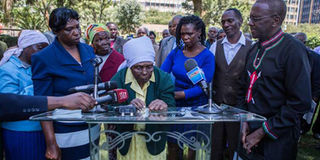Homeguards were paid Sh3,000 for capturing Kimathi, court files reveal

Chief Justice Willy Mutunga hands over the trial files of freedom fighter Dedan Kimathi to his widow, Mukami, and her two daughters in Nairobi on March 17, 2016. The files show that Kimathi had epilepsy and suffered attacks during his trial. PHOTO | ALAMIN MUTUNGA | NATION MEDIA GROUP
What you need to know:
Kimathi was sentenced to death on November 27, 1956, by Chief Justice K K O’Connor.
He appealed the ruling in the East Africa Court of Appeal the same year through lawyer Ralph Milner.
The records show that Kimathi’s trial took slightly over three months before he was executed.
The trial file revealed a man who was under great pain during the court proceedings.
Details have emerged about the trial and hanging of freedom fighter Dedan Kimathi Wachiuri, whose remains have never been found, 59 years after he was killed.
Court documents that Chief Justice Willy Mutunga gave Kimathi’s widow Mukami on Wednesday show that two home guards who captured Kimathi were paid Sh3,000 as a reward.
The files also show that the freedom fighter was hanged four days after his appeal was rejected by the Judicial Committee of the Privy Council.
The records show that Kimathi’s trial took slightly over three months before he was executed. They also show that he suffered epileptic seizures.
Kimathi was sentenced to death on November 27, 1956, by Chief Justice K K O’Connor.
He appealed the ruling in the East Africa Court of Appeal the same year through lawyer Ralph Milner, but the appeal was thrown out a month later.
He then petitioned the Judicial Committee of the Privy Council (the highest court of appeal) “for special leave” to appeal against the judgment of the Court of Appeal, but his request was declined on February 14, 1957.
Kimathi was hanged following an execution warrant signed by Sir Evelyn Baring, who was the governor of the Kenyan colony at the time.
“Now, therefore, I, Evelyn Baring Knight Grand Cross ... Governor of the Colony and Protectorate of Kenya … do hereby order the said Dedan Kimathi son of Wachiuri shall be hanged by the neck till he is dead,” the warrant reads.
“I do hereby direct that... the body of the said Dedan Kimathi son of Wachiuri shall be buried or cremated at such place as you shall appoint.”
The hangman was further ordered to file a report “without delay” to indicate that the execution warrant had been executed.
After Kimathi was hanged, H. M. Whitehall, the officer in charge of “Her Majesty’s Prison”, now Kamiti Maximum Prison, filed a report in which he said: “I have the honour to inform you that I carried out the sentence of death upon Dedan Kimathi son of Wachiuri in the prison at Nairobi at 6am this 18th day of February 1957.”
GREAT PAIN
The documents — now available to the public — were retrieved from the Senate House Library of the University of London in the United Kingdom.
The file had been handed to the library as a donation from the private collection of Mr Milner, Kimathi’s lawyer.
The trial file revealed a man who was under great pain during the court proceedings. Kimathi had been shot and badly injured during his arrest on Sunday, October 21, 1956.
After his execution, a medical officer identified as Mr K E Robertson was also at hand to confirm that Kimathi was clinically dead and even filed a report to that effect.
“I hereby certify that I was present at the execution of Dedan Kimathi son of Wachiuri at about 6am and after execution, I examined the body of the deceased man and found life to be extinct. Death was caused by hanging and was instantaneous,” said Robertson in his report.
Cumming and Miller, the law firm that represented Kimathi during his trial, was paid Sh4,405 by the court.
The debit note read in part: “Honorarium for defending pauper before Supreme Court at Nyeri ... case number 46/56”.
HOW HERO WAS CAPTURED
Kimathi was arrested in Nyeri by two Africans employed by the colonial government as security officers, locally known as home guards. The two had been guarding part of a trench that had been dug to separate the village from Mt Kenya Forest, where Mau Mau fighters — a guerrilla army of locals whom Kimathi was leading to fight the colonialists — were suspected to have been hiding.
The trench was to keep the Mau Mau fighters from invading the village for supplies.
According to the documents, just before dawn, the two home guards, identified in court documents as Constable Ndirangu and Constable Njogi, were patrolling the trench on the village side when they saw the shadowy figure of a man carrying a piece of sugarcane.
The man was attempting to climb out of the trench and disappear into the forest when they ordered him to stop.
Kimathi was shot in the thigh and groin near River Thengeraini (he could not pass urine for several days after that) and hid in the bush for about 20 minutes before he was ordered to crawl out. The home guards seized a pistol, six rounds of ammunition and a simi (sword) from the freedom fighter.
Two other home guards, Sergeant Mwangi and Corporal Wanjohi, arrived at the scene on hearing the shooting. The home guards were each given Sh3,000 as a reward for capturing Kimathi.





